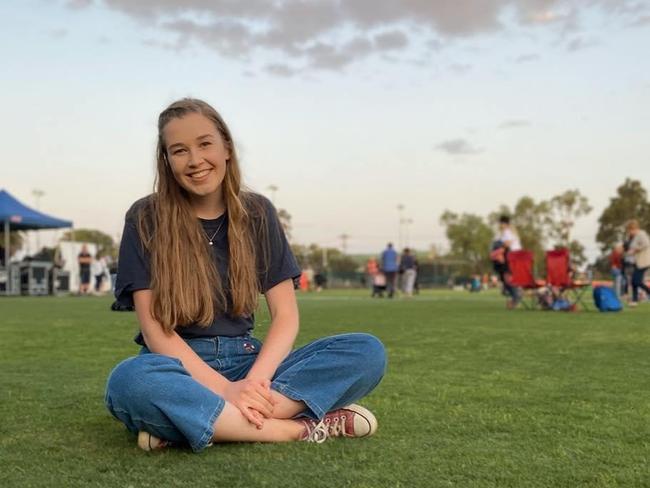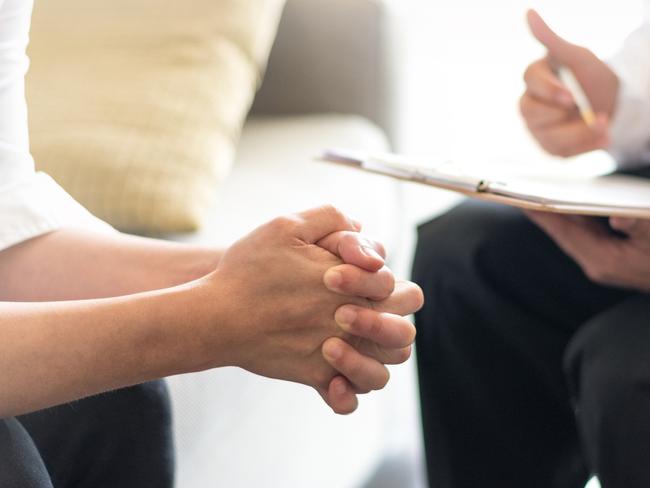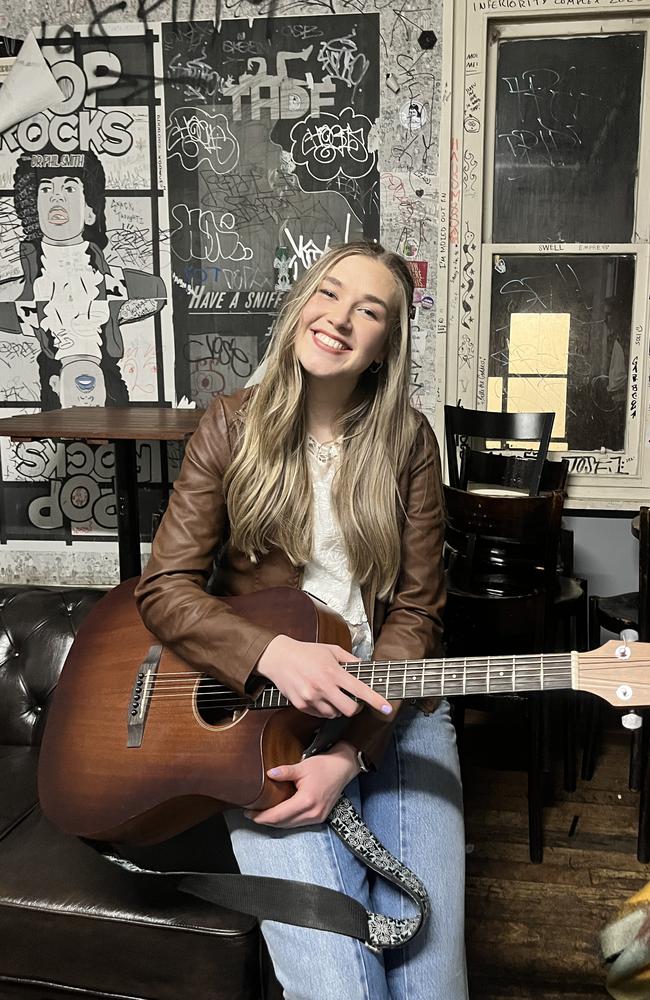I battled extreme exhaustion and anxiety for years. Then I found out I have coeliac disease
Just a few years ago, I was couch-ridden and suffering from anxiety and exhaustion. Little did I know a gut issue had completely taken over my life.
Nutrition
Don't miss out on the headlines from Nutrition. Followed categories will be added to My News.
Gotta say, it’s a strange task taking to the internet with an entire dialogue of my stomach issues.
But, dear reader, if my little tale somehow helps you in your health journey, there’s no reason not to spill my guts. Finding out I had coeliac disease two years ago truly changed the trajectory of my life for the better.
Before we dive in, I must preface that symptoms differ for everyone. I can only offer my own experiences and hope someone sees part of their own story in it to get help.
Plus, I’m no expert – but Coeliac Australia’s health advocacy officer Penny Dellsperger is, and was kind enough to offer her insights (and taught me a whole lot!)
What is coeliac disease?
The most basic explanation of coeliac disease is a severe intolerance of gluten.
It’s a result of the immune system attacking gluten in the small intestine, which causes damage to the intestinal lining and prevents it from functioning properly.
Two years ago, I was eating gluten like it was going out of style. In fact, I earned the nickname ‘Burger Girl’ at work after the sheer rate of bread I’d inhale on shift at the restaurant.
I grew up on pasta and bread and never had any problems. But after traumatic events in 2019, everything changed.

“People are born with the genetic susceptibility to coeliac disease. Those genes are quite common, so about 50 per cent of the population in Australia carry this HLA type of gene that predisposes you to coeliac disease,” Ms Dellsperger told me.
“Only one in 40 of those actually develop coeliac disease.”
Why? The triggering process is not completely understood, but some have put it down to abnormal stress on the body (even gastro in children), pregnancy and trauma.
Eating gluten doesn’t equal stomach pain
No, eating gluten did not send me running to the bathroom. For me, it manifested itself as absolute exhaustion.
Such exhaustion that I could spend entire days on the couch and still feel tired. Such exhaustion that I couldn’t hold conversations for very long without saying I need to sit down. That saw my summer holidays vanish and suddenly I was at university, struggling to get good grades despite topping my class just the year before.
Being so tired all the time did horrors for my brain. The sheer anxiety I felt at the thought of going to work was so debilitating I had to blast music while getting ready to get me through.
It compromised my relationships. It compromised my memory. I describe the brain-fog now like being a step back from reality. I was there, but I wasn’t. I couldn’t process the trauma I’d been through. A therapist told me to take antidepressants. I felt broken.

One night, I was taken to hospital in the middle of the night for severe pain. The nurses prodded my stomach, asked me if I could be pregnant, and then sent me home. A GP told me I probably had ovarian cysts and should probably get a scan.
But I cannot say this with enough gravity: I truly believed I was fine, and that it was nothing to worry about. I didn’t know the alternative.
It’s a vicious cycle
You’re eating gluten without knowing any better. Meanwhile, your intestines are copping an absolute flogging. Being so damaged, they can’t properly absorb nutrients into your body. So then you’re constantly tired. And craving carbs. Carbs = usually gluten. Repeat the cycle.
Mum told me to go to the doctors. It was hard not to take offence when I thought nothing was wrong.
“Mum, I’m just tired,” I’d tell her. “I had a huge year doing year 12, I’m still recovering” turned to “I had a huge year working full time, I’m just recovering.”
You shouldn’t have to spend weeks, months ‘recovering’ from usual levels of energy expenditure.
When I couldn’t get off the couch for months after quitting my job, Mum knew there was something more sinister at bay, and was determined to get me help.
Thank God for Mum and this treasure of a doctor
I’d been to many doctors before, who would send me out the door with a vague “could be this” and “take iron tablets”.
Bless my Mum for forcing me to another doctor.
When I reluctantly went to yet another GP, I was surprised to find someone genuinely interested in my health and knowledgeable about the symptoms I had.

“Mum wants me to get my iron tested,” I told her. “Plus I get this weird pain in my side, I think it’s ovarian cysts.”
“Pain and low iron? I’m going to test you for coeliac disease. We at least need to rule that out,” she said.
She called me herself to tell me the results. From memory, the antibody they test for coeliac disease should sit between a level of 0 and 10. A strong positive result was 80 or above. I was measuring in the 500s.
Getting diagnosed
Despite my result being clear as day, you have to get a biopsy to confirm a diagnosis — a gastroscopy.
When I woke up, my specialist showed me a picture of my intestines. He told me there was such severe damage, he was positive I had coeliac disease before results even came in.
Cancers, pain and bloating were on the long list of symptoms if I kept eating gluten. It was the risk of infertility that scared me into instantly changing my diet.
Suddenly, everything is different.
I noticed – my family noticed – a difference within two weeks of cutting gluten. I woke up with energy. I wanted to engage in conversations. I was processing my emotions to a level I hadn’t been able to since I was 15.
Truly, it’s sad to think how hard life was now that it’s better.

But it’s not all roses. Healing meant my body began identifying gluten more readily. Yep, that means running to the bathroom. And pulling over on the side of the road.
Just 10 milligrams of gluten can cause a reaction in some sensitive coeliacs.
“We’re talking about one one-hundredth of a slice of bread – a bit of bread about the size of a baby’s fingernail,” Ms Dellsperger said.
“Once you get to 50 milligrams of gluten, that’s a level where you’re seeing damage in most people.”
I know I’ve been ‘glutened’ when the brain fog returns. I suddenly feel thirsty and uncomfortable. Then the pain hits, and I need to spew. All within about an hour of eating gluten.
It also means having to analyse every piece of food that enters my body. How horrible I felt when I had to run home from my internship here at the Herald Sun after a bad lunch stop. How much of a prude I feel constantly asking waiters for the gluten free menu, or if their chef will use different trays to cook my food. How annoying I feel asking my friends to change their dinner plans to go somewhere I can eat too.
Fight for your health
I cannot overstate how a ‘simple’ change of my diet has improved every element of my day to day. From the way I can process information, how well I can maintain relationships, have conversations, handle stress, THINK.
If you’re trying to find answers about your health, keep searching. There’s nothing more important.
Ms Dellsperger put it best: “It’s not just a choice that we make. It is a medical necessity.”
If it could be coeliac disease, keep eating gluten until you get a biopsy done, so the full effect of gluten on your body can be measured.
And finally, if you’re a mum trying to convince her daughter to get tested, keep pushing. I’m so thankful my mum cared enough to endure my annoyance for answers. Thanks, Mum.



